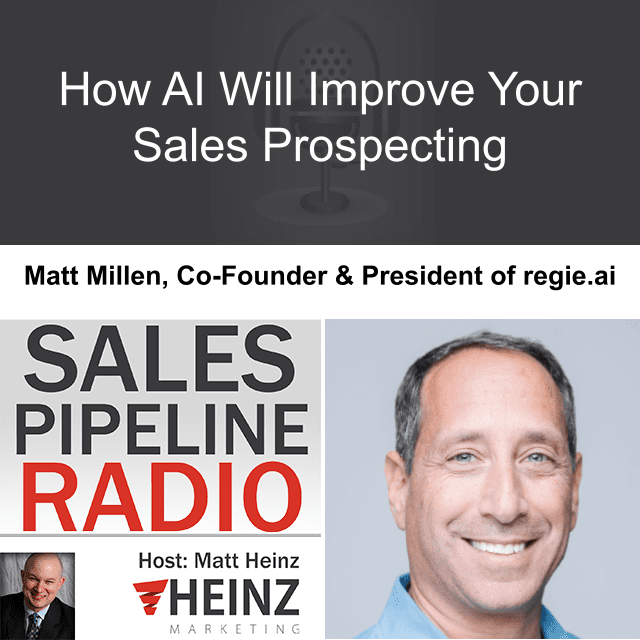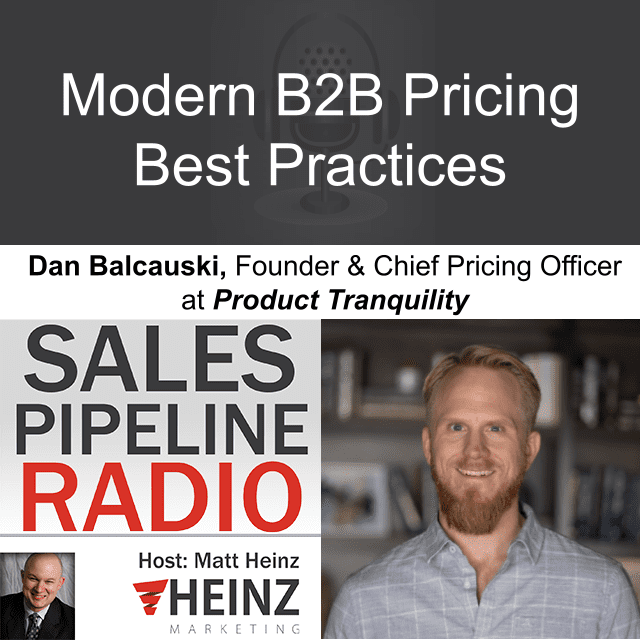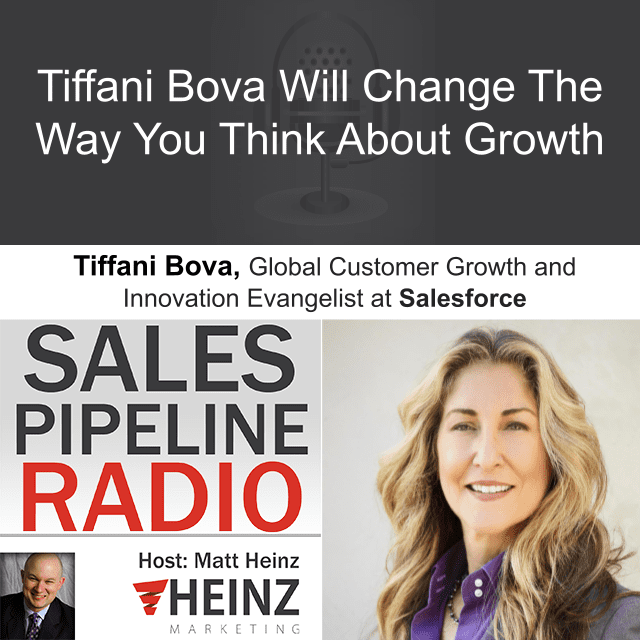Sales Pipeline Radio, Episode 342: Q & A with Matt Millen

By Matt Heinz, President of Heinz Marketing
If you’re not already subscribed to Sales Pipeline Radio or listening live every Thursday at 11:30 am Pacific on LinkedIn (also on demand) you can find the transcription and recording here on the blog every Monday morning. The show is less than 30 minutes, fast-paced and full of actionable advice, best practices and more for B2B sales and marketing professionals.
We cover a wide range of topics, with a focus on sales development and inside sales priorities. You can subscribe right at Sales Pipeline Radio and/or listen to full recordings of past shows everywhere you listen to podcasts! Spotify, iTunes, Blubrry, Google Play, iHeartRADIO, Stitcher and now on Amazon music. You can even ask Siri, Alexa and Google or search on Audible!
This week’s show is entitled, “How AI Will Improve Your Sales Prospecting“. My guest is Matt Millen, Co-Founder and President of regie.ai.
Tune in to learn:
- How has technology evolved to shape the sales process over the years? What are the key challenges faced by sales reps today due to the reliance on templates and personalization slowdown?
- What are the real benefits of AI in sales, and how can it improve sales productivity and outcomes? How can AI make prospecting and email personalization more efficient and effective?
- What are the implications of AI on the role of BDRs (Business Development Representatives) in sales? Is the human touch still essential in the age of advanced technology? How can AI and humans work together to enhance the sales process?
Watch the video, listen in below and/or read the transcript below.
Matt Heinz: All right. Welcome everyone to another episode of Sales Pipeline Radio. I’m your host, Matt Heinz. I’m excited to have y’all here today. We have a really exciting topic conversation and guest today talking about the impact of sales, assuming the impact of AI on sales and the evolution of tech in sales.
If you like what you hear today, every episode of Sales Pipeline Radio past, present, future, always available at SalesPipelineRadio.Com. I’m very excited for our topic today. I was at MAICON (Marketing AI Institute’s conference) last week in Cleveland. It was two days of discussion on the impact AI is already having on marketing in particular, which is just scratching the surface of what is to come. And inherently we started talking about some of the broader go-to-market motions as well.
The impact on sales, marketing, customer success, account management. So very excited to have with us today, Matt Millen. He’s the CEO of regie.ai. So first of all, Matt, thanks very much for taking the time joining us today.
Matt Millen: Great to be here with you, Matt. And great to see you again, my friend.
Matt Heinz: Absolutely. Well, you have had a front seat to the evolution of technology and sales given your role at Outreach and elsewhere. So maybe start with a little bit of your background. Kind of where you’ve been, what you’ve seen. And let’s talk about that evolution of how technology has supported enhanced, accelerated the sales function and impact.
Matt Millen: Yeah. Maybe it goes back too far, Matt. I started in 1987. So, this is before corporate email. This is before the internet, and I’ve had a front row seat to the infusion of technology into the selling process. And what do you start to see is you start to see the problems that technology solves. You also start to see some of the problems technology creates.
As you mentioned, I was at Outreach leading revenue there. And Matt, for the first time in my career at Outreach, content was a problem for the modern sales rep. And what I mean by that, a few things were happening at the same time. One, sales was getting reliant on these template email sequences to go out.
So, somebody had to figure out how to write them to drive engagement. And at the same time, personalization was slowing down because we had templates. That’s when we figured out there had to be a better way to engage our prospects and customers.
Matt Heinz: Well, you’ve been a part of that for a long time. I remember spending a lot of time with you at Outreach. And now excited to see what you guys are doing here today. I love the idea of the problems that tech solves as well as the problems that tech creates. It could similarly be said for artificial intelligence as we start to grapple with what that means in sales and marketing.
Obviously what I see it as a huge opportunity, very exciting. A lot of people are pretty scared about what AI is, what it’s going to do. Talk a little bit about that. Let’s talk about that up front and address some of those fears and how you are addressing and managing that with the work you do and with your customers.
Matt Millen: Yeah, I think to give that context is like to look at the evolution of selling, you know, at the earliest stage, most reps did everything. Most reps were full cycle. We didn’t have any technology. You rely on habits and bias in terms of what to do. You know, 10 years ago, software automation came for sales.
And this was like an amplification of activity. Good activity got amplified. Bad activity got amplified, but it allowed us to do more. And it also, from a team perspective, you started seeing role specialization and teams where you had teams like sales development reps, focusing on top of funnel, account executives, or closers, post-sale and success. We started seeing that then all of this automation started giving us insights and data. So, it wasn’t just do more. We can start figuring out what was working and how can we get better. And now we’re in a completely different world now in the new world is this we’re going from simple automation and simple automation is really where the human makes the decision and the technology helps us execute, and that’s the world of sales engagement as we know it.
Or, you can have some automation in your CRM helping you here, but where we’re going is AI automation. And the difference is like the machines are going to make the decisions. And humans will help execute the tasks and so the major shift is like, who can make the better decision based on the data very quickly and help guide us into optimizing the actions and the activities that we’re taking to drive the results and the outcomes?
Matt Heinz: I think that’s a really important distinction between the jobs and the tasks, because at the same time, I hear some salespeople and even people throughout go to market marketing sales, other roles worry about what AI is and what it’s going to do.
They concurrently complain about some of the tedious, repetitious tasks that they’re asked to do. And if you look at frontline salespeople, “we need you to prospect. We need you to create this email. We need you to mark all this in CRM,” all these things the salespeople have complained about forever, rightly so, right?
Because this isn’t an act of selling motion. This seems like this is a godsend. If we now have robots and machines that can take those tasks off of our plates and let our craftsmen, like our specialists who can master the art of sales and do what they do best with more of their time.
Matt Millen: Yeah, I would agree. And you might also want to like deconstruct those tasks. So, there’s elements of those tasks that we can better leverage technology, better leverage AI. So, think about personalizing an email for a moment. You know, you can’t personalize without doing research and research takes time.
I would go out to Matt Heinz’s LinkedIn profile. I would look at your company website. I would search news on you. I check your Twitter feed. I have to open up multiple tabs, go to multiple places. And then I’ve got to extract something that’s contextually relevant to why I want to reach out.
And then I’ve got that daunting task of “how do I take what I’ve learned about you, combine that with why I want to talk to you and compose an email worth reading that’s going to get your attention?”. So the average rep that’s going to take 17 to 22 minutes to do, with some pretty poor engagement. My product will do this in 37 seconds and the engagement is significantly higher.
It can be depending on whose stats you’re looking at it with 250 to much higher, you know, it’s going to depend. But the point is. You’re doing two things at the same time here, Matt. One is you’re increasing your ability to drive productivity. So, what used to take 17 minutes now takes 37 seconds. So you’re doing more.
And in most cases, you’re doing better. Because the contextual nature of the email, how it’s written using industry best practices is typically better constructed and designed to stand out in the mailbox and drive engagement. So, we’re going further faster with AI. That’s what the net result is. So, we don’t want to be scared of this.
What we want to figure out is how do we incorporate this into our workflow to allow us to go further faster? And that’s available today, right now.
Matt Heinz: It certainly is. To your point, what’s available right now, I think it’s just scratching the surface of what we’re going to see if we have this conversation in a year.
If by default ask AI to do whatever you’re starting to do next, a lot of things it’s not going to do, but if it can’t do it today, put that question on a shelf and wait for chat GPT 4.5, wait for Deep Mind from Google early next year. Like the capabilities are going to go crazy. I want to address this from a perspective of change management. Right. So, we can talk all day long about prospecting lead response, mid funnel triggers, customer success, impact, all the things. We are asking sales reps to change their behavior.
We did this when we asked them to use CRM. We did this when we asked them to start using outreach, new tools, new processes, changing my behavior, even if it is to my benefit, sometimes it starts with a response of trepidation. So how, from your experience, having done this so many times, how do you manage through the change management to get adoption of these new tools?
Matt Millen: So, first of all, it’s a very good question and it’s for some teams more than others, it’s a very real problem. Number one, you talk about like adoption, there’s historically low adoption on your CRM. It’s not easy to use. It’s not fun to use. It’s not naturally positioned in your workflow. It’s something you have to go do. What Outreach and Sales Loft and others did was it supported your main workflow and it updated the CRM for you, right? So, you sat on it for workflows. So, one of the things that you see different engagement rates with different software, based on how naturally it sits in your workflow.
So, AI adoption can be hard or easy. Here’s four things that we’ve done to drive engagement because, you know, you said, hey, run out to chat and do something. We don’t think you should run out anywhere. So regie.ai is integrated with your sales engagement platform, your CRM, LinkedIn, LinkedIn navigator, your email inbox, wherever you as a sales rep are working, you don’t have to go anywhere, regie’s is right there as your copilot. It’s right there.
Number two, it actually knows what you’re doing. So, it’s going to serve up content relevant to the step. You don’t have to go prompt it, tell it what you need, like regie intuitively knows what you need right where you are.
Third, is the output then doesn’t need any editing or trying to figure out what you got. It’s sales ready content that you can just use. You can edit it, but you don’t need to.
And then fourth, like to support it, your manager needs visibility. Your manager needs to be able to coach you and manage you. So, we provide a manager dashboard that shows all the personalization engagement and what’s going on.
So, you got great content for your Monday morning sales meeting. You can coach your reps one on one. So first is you need a product that supports adoption. So, it needs to be enterprise grade. It needs to understand. And then quite frankly, it needs to be three things.
It needs to be easy. It needs to be fun. And it needs to work.
It needs to do what the promise is. And that’s how we think about it. So we sit in the workflow, and quite frankly, if the manager is saying, Matt, I need you to, personalize 17 emails a day, the average email takes you 20 minutes, there’s no way and now you can do it.
So, it’s training.
Now, there are situations where teams still don’t want to adopt the technology. We’ve got the ability to basically do the personalization that the reps, whether they want to do it or not, we serve it up, and then we can just send them out automatically. So, we’ve got the ability now to be a copilot with a rep or an autopilot for the rep.
Matt Heinz: We tend to think about technology, especially frontline tech tools like this as primarily impacting your BDRs, your sales reps, your AEs. Can you talk about why this is so beneficial to sales managers, right? Not just in terms of sort of the visibility into what’s happening, but one of the biggest complaints I hear from sales managers is they spend too much time in spreadsheets and reports and not enough time coaching, right? Not enough time provide serving as a coach to their reps into their teams. It seems to me that with the automation of more of these tasks, it allows the managers to do a better job of coaching performance and skill sets among their teams as well.
Matt Millen: You’re 100% right. The managers want to be better, better managers. They want to be better coaches. But I think managers have these fundamental challenges in sales. And I would say all of us do.
Challenge number one, you want your reps to be busier. That means doing the right things more often.
Number two, managers want more of their team winning. You want better participation, more reps actually contributing to the success.
And three managers want to know what’s going on. Those are the three things that most managers and sales are looking for.
Be busier, hit your number and I need visibility, so I know where to dive in and help you. And AI can help. AI can help the activity levels. Doing more of the right things quickly, by that more reps will ultimately be effective and successful in their role and better instrumentation of the process allows them to understand very quickly what’s going well and what isn’t so they know where to go in and where to be a great coach, where to be a great manager.
Matt Heinz: I’ve been told that the role of the BDR is going extinct. The function of the BDR is becoming irrelevant in the sales process and that AI is going to take over that job and do it on behalf of humans– GO!
Matt Millen: So first of all, it’s one of the best debates on LinkedIn. I think role specialization makes sense on certain sales cycles with certain products that have enough value to justify the way that they’re creating that division of labor. Other sales cycles are maybe better tuned for a full cycle in the rapidity of the actual sales process.
So, I don’t think there’ll be one or the other. I think not one will dominate. It’ll depend. That being said, AI can help regardless of how you’ve structured your team, how you’ve structured your buyer’s experience with you.
Matt Heinz: It’s an interesting debate on LinkedIn and other places. I’ve had this discussion last week the marketing context and, separating the idea of sort of jobs and tasks.
If you ask a marketer what they did in the 1960s, that would be a very different looking job than what they did 40 years later when the internet showed up, let alone what has been happening now, 20 plus years later. Right. I remember, my dad did marketing for caterpillar tractor. And I literally one day said, like, I can’t imagine doing my job without a computer.
How did you do your job? He said, there was no concept of a computer. We did it differently. The job and need and the role persists. And I think that we continue to see technology for years, right? Having an improving our ability has been giving us tools to do our job. But tools and tasks are different than the job at hand.
Maybe someday robots are going to sell the robots, but we are social people that like talking to other humans. And I think that human touch that art, that craftsmanship that goes along with that, that can be enhanced with technology that can be supported and augmented with the right tools to let people do what people do best. I think other people respond to that well.
Matt Millen: 100%.
Matt Heinz: All right. Well that’s about all the time we have today. Matt Millen, President of regie.ai. Thank you very much. It’s great to see you again. Great to hear that you guys are doing well. Hi to Nina and the whole team over there. You guys have built a real dream team on your exec team as well. So glad to hear you’re doing well and good to see you.
Matt Millen: Cheers, my friend.
Matt Heinz: Awesome. Thanks so much to Matt. Thank you to everyone for joining us today. We’ll be back here next week, every week, 11:30 am Pacific. Thanks for watching. This has been another episode of Sales Pipeline Radio. Take care.
Listen to the Latest Episodes:
Matt interviews the best and brightest minds in sales and Marketing. If you would like to be a guest on Sales Pipeline Radio send an email to Sheena@heinzmarketing.com.




